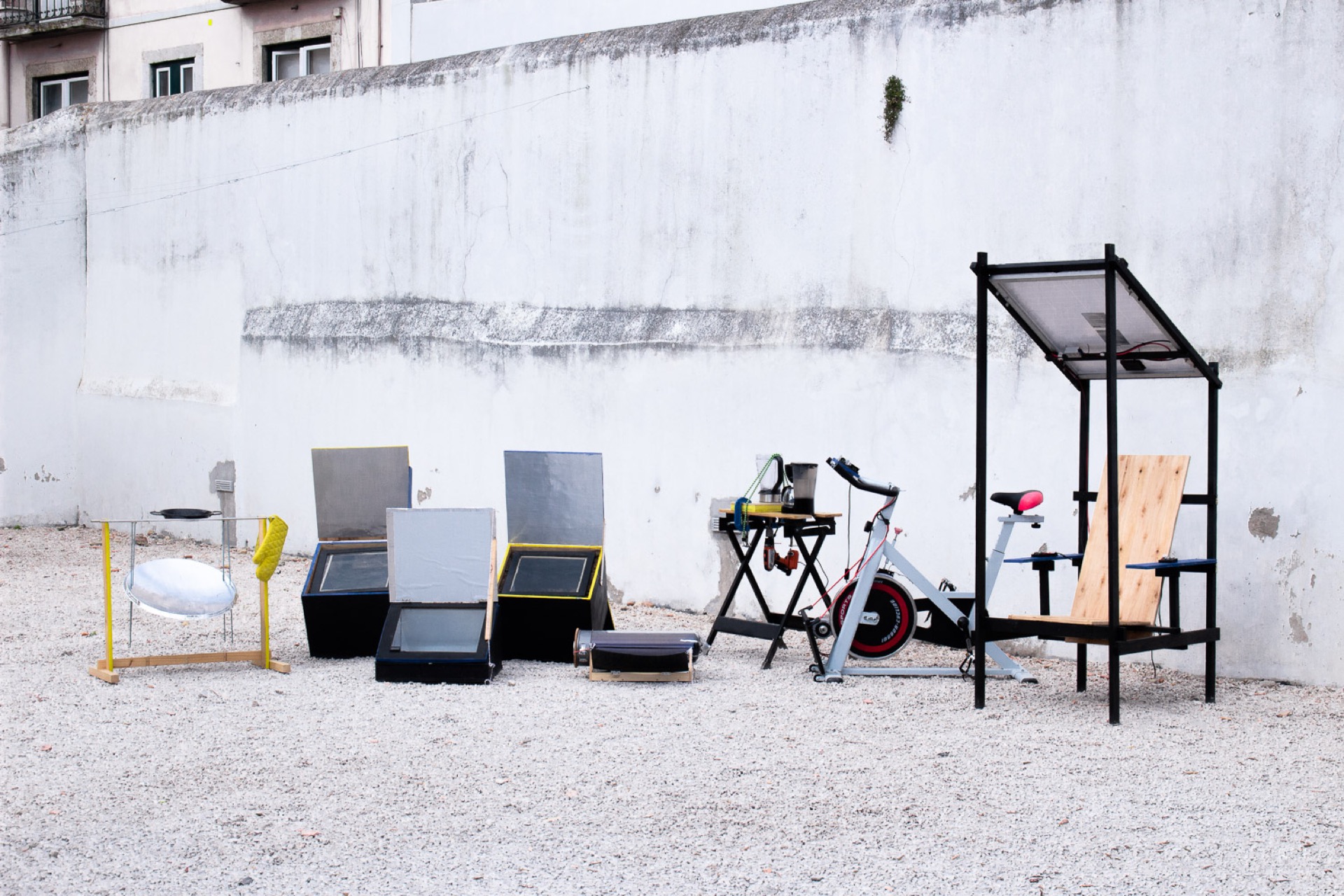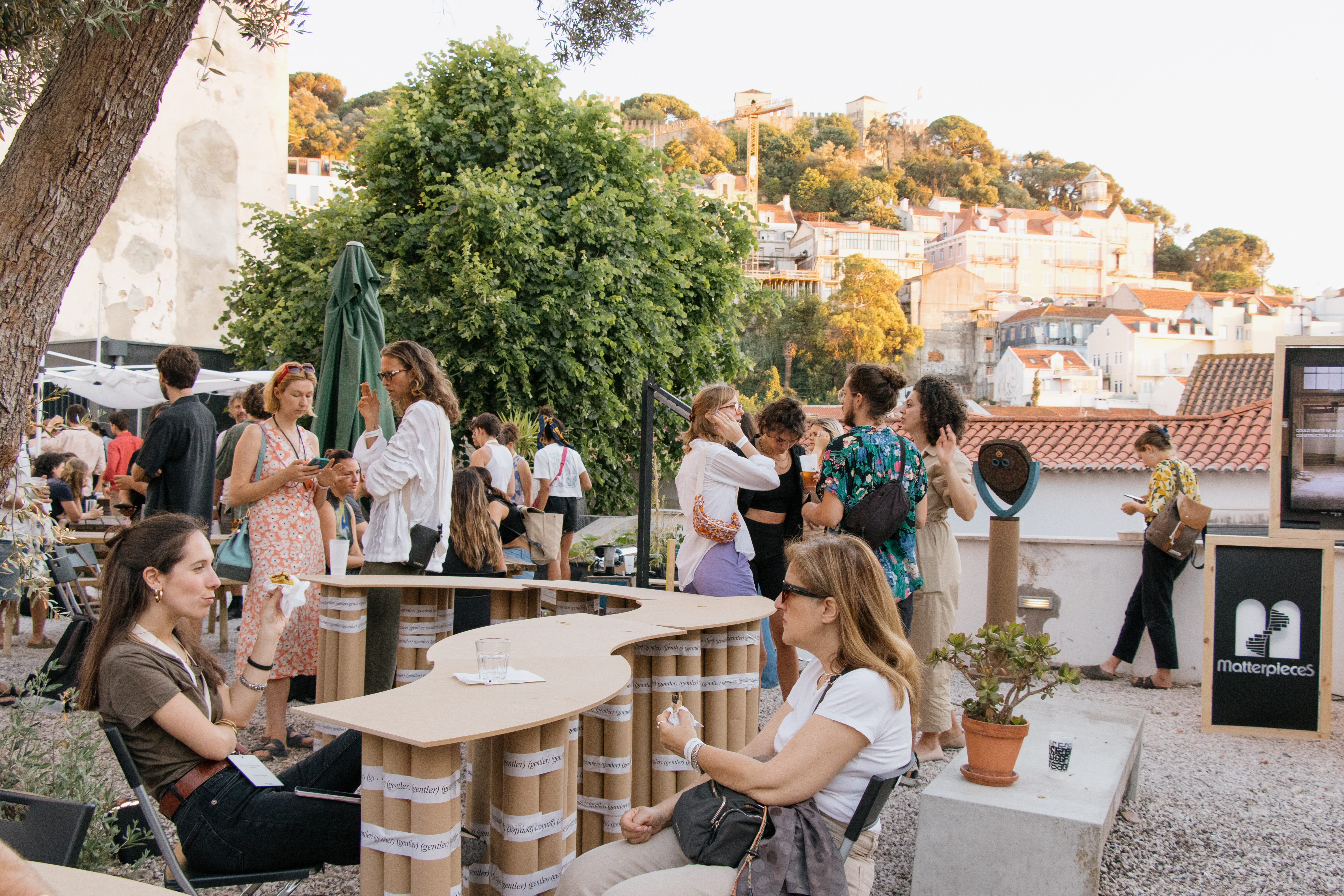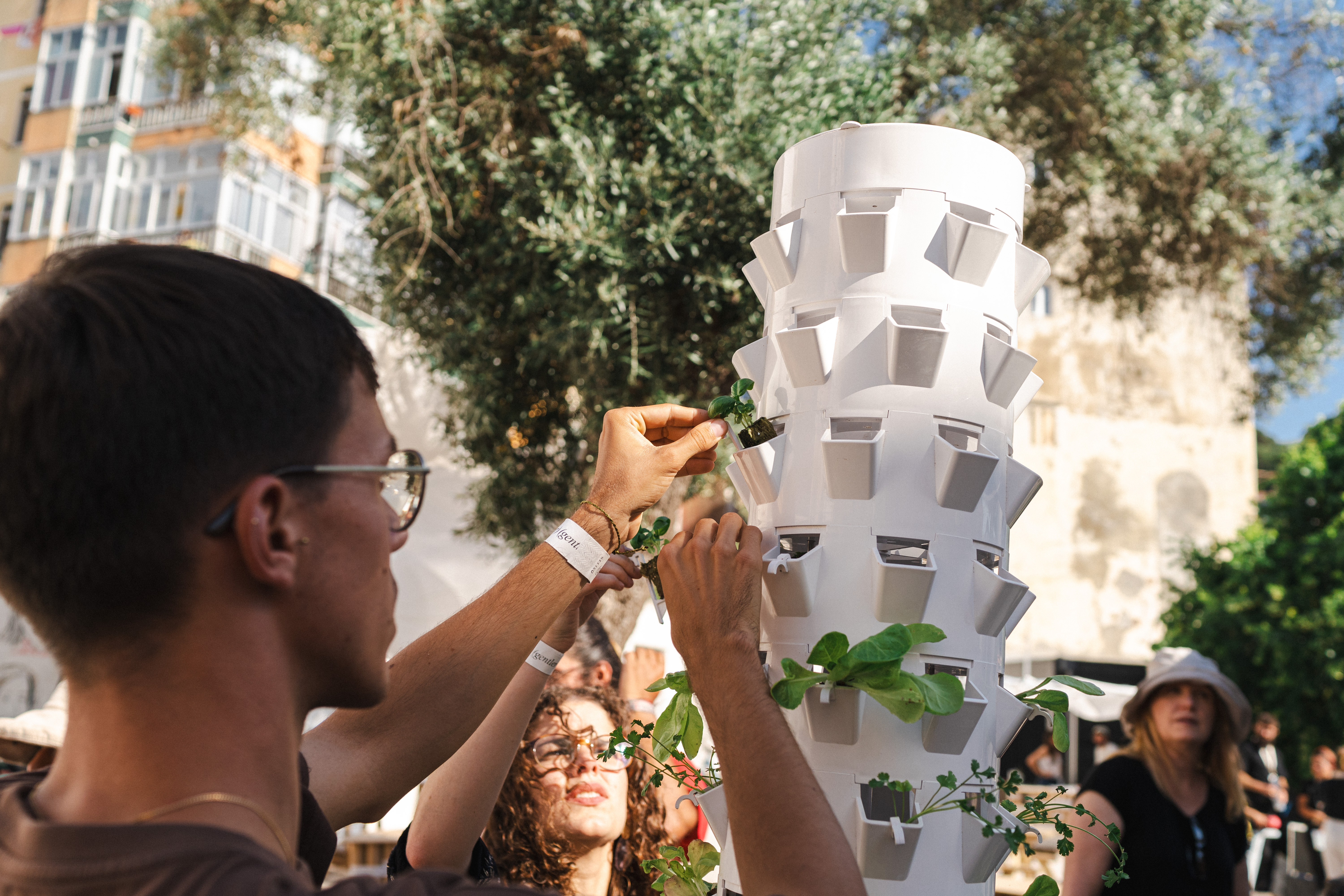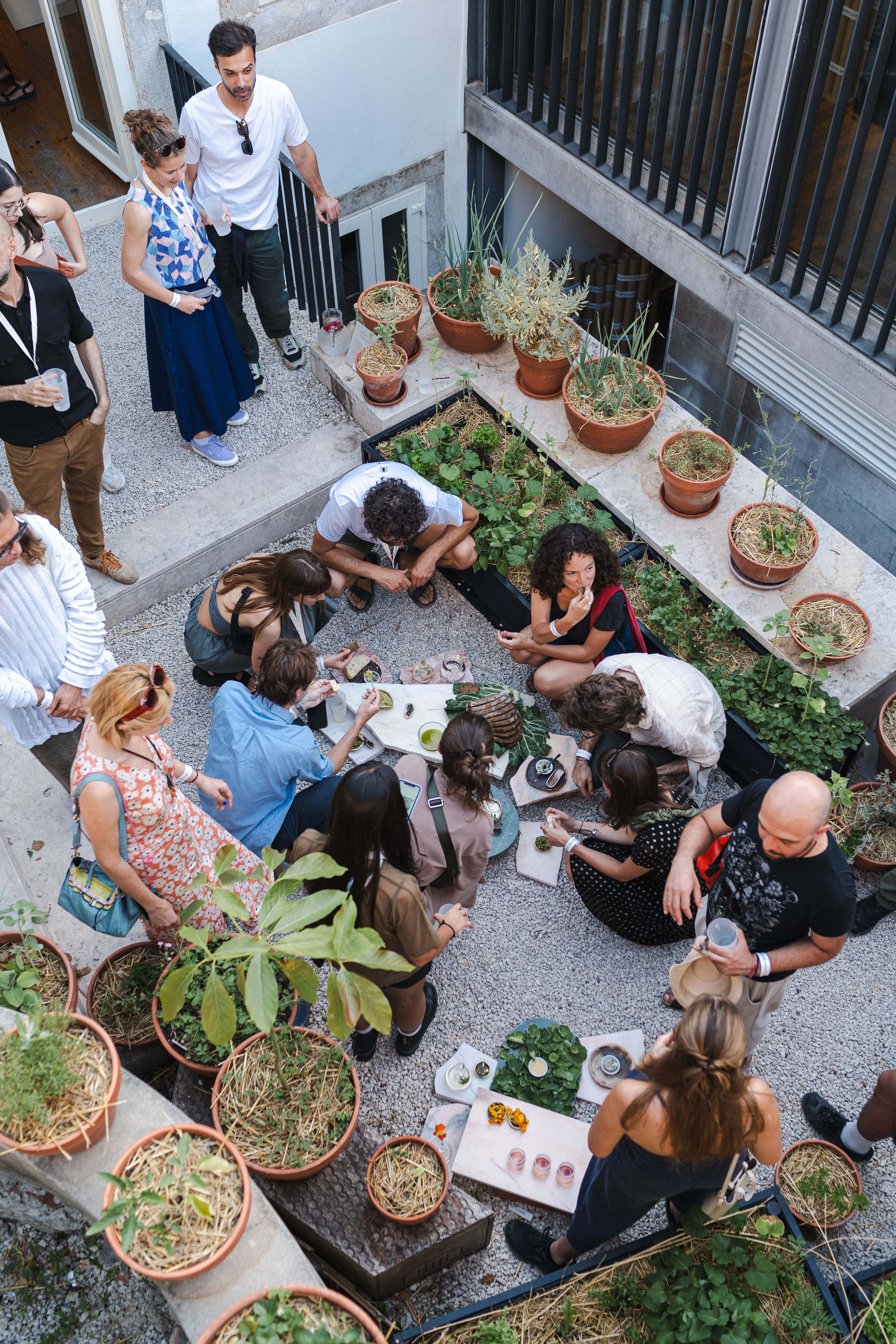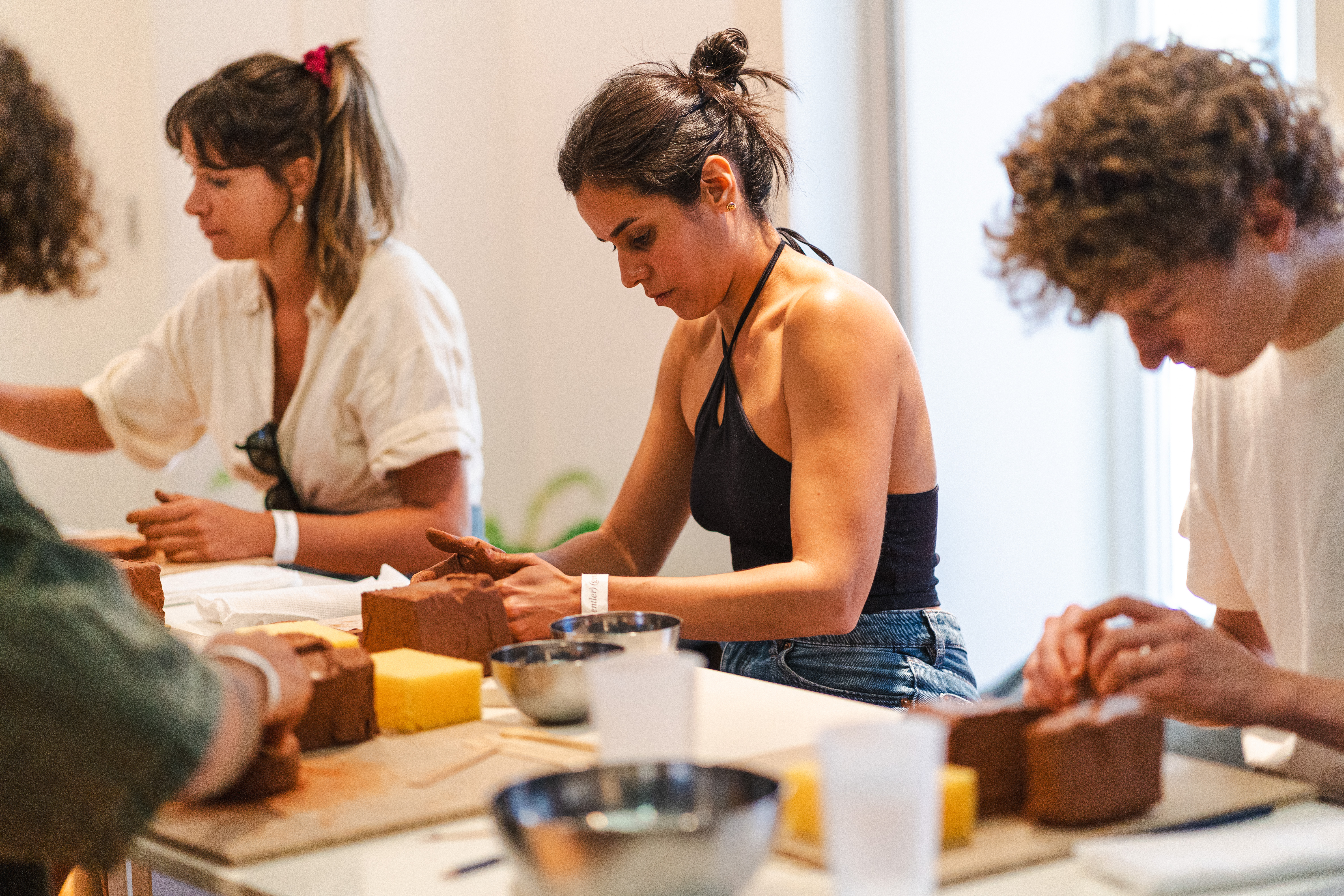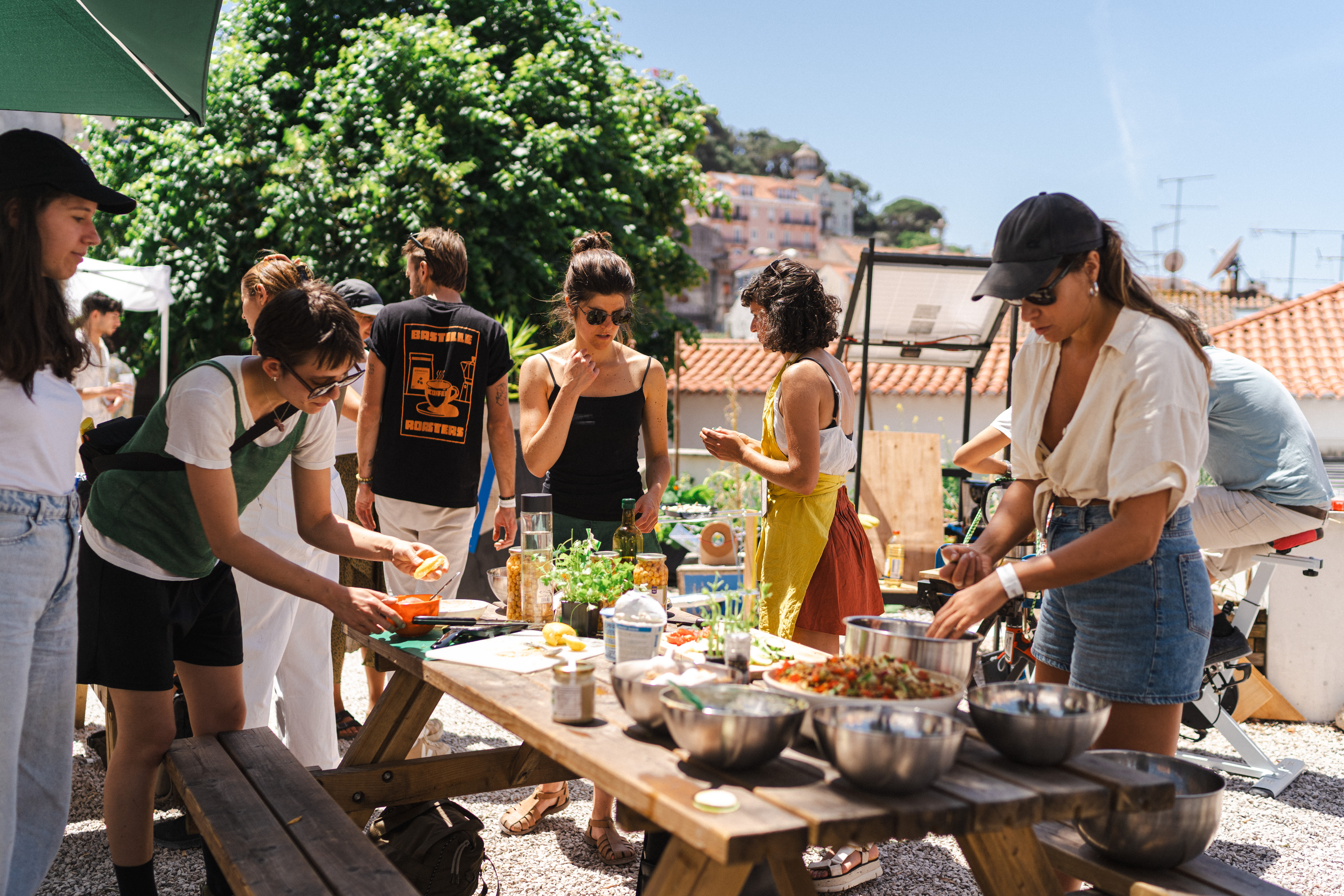Shaping a circular industrial ecosystem and supporting life-cycle thinking
Gentler Futures Festival
Gentler Futures: Towards Urban Self-sufficiecy
A celebration of design as agent of change—design that goes beyond design and stimulates a type of transformation that sometimes is cultural, other times social, sometimes economic, and other times environmental.
Portugal
Local
Lisbon (PT)
Mainly urban
It refers to other types of transformations (soft investment)
Yes
2024-06-01
No
No
No
As a representative of an organisation
Gentler Futures Festival is an exploration of what it means to design for tomorrow, what challenges 21st century designers face and what legacy they hope to leave behind.
In May and June 2024, Gentler Futures gathered designers, architects, policymakers and researchers whose work weaves design with radical thinking, advocacy, community empowerment, and a genuine thirst for paradigm shift. Be it society-centred, life-centred or planet-centred design, at its core, it’s what holds a sense of both accountability and stewardship for the broader multitude of systems that we, humans, shape and impact. This is what inspires us, drives us, excites us. This is what we celebrate.
The theme of the first edition, Towards Urban Self-Sufficiency, glimpsed into a future where urban communities are locally productive, instead of passive consumers, and self-sufficient, rather than dependent on far-away centralised systems. This through the presentation of experimental projects of designers, architects and makers whose goal is: decentralising means of production, imagining alternative non-linear manufacturing systems, and placing the needs of local communities over profit and growth.
For 2 days, the program, featuring hands‒on workshops, talks, temporary exhibitions, installations, screenings and live performances, was meant to pose questions, launch provocations and inspire new mindsets. Invited creatives, along with talents selected via open calls, were given the platform to showcase their work as proof-of-concept of the futures we look forward to: circular, sustainable, locally-productive, resilient, self-sufficient.
Open to the local community and to the general public, the program sparked meaningful conversations and inspired new ideas around the topic. While at the same time, allowed professionals and enthusiasts in the creative, research and sustainability space the opportunity to explore thought-provoking approaches, network and exchange knowledge in an informal event.
In May and June 2024, Gentler Futures gathered designers, architects, policymakers and researchers whose work weaves design with radical thinking, advocacy, community empowerment, and a genuine thirst for paradigm shift. Be it society-centred, life-centred or planet-centred design, at its core, it’s what holds a sense of both accountability and stewardship for the broader multitude of systems that we, humans, shape and impact. This is what inspires us, drives us, excites us. This is what we celebrate.
The theme of the first edition, Towards Urban Self-Sufficiency, glimpsed into a future where urban communities are locally productive, instead of passive consumers, and self-sufficient, rather than dependent on far-away centralised systems. This through the presentation of experimental projects of designers, architects and makers whose goal is: decentralising means of production, imagining alternative non-linear manufacturing systems, and placing the needs of local communities over profit and growth.
For 2 days, the program, featuring hands‒on workshops, talks, temporary exhibitions, installations, screenings and live performances, was meant to pose questions, launch provocations and inspire new mindsets. Invited creatives, along with talents selected via open calls, were given the platform to showcase their work as proof-of-concept of the futures we look forward to: circular, sustainable, locally-productive, resilient, self-sufficient.
Open to the local community and to the general public, the program sparked meaningful conversations and inspired new ideas around the topic. While at the same time, allowed professionals and enthusiasts in the creative, research and sustainability space the opportunity to explore thought-provoking approaches, network and exchange knowledge in an informal event.
Self-sufficient cities
Systemic and sustainable design
Community-driven approaches
Circular economy
Local and decentralised production
Gentler Futures is an exploration of what it means to design for tomorrow, what challenges 21st century designers face and what legacy they hope to leave behind. The theme of the first edition, Towards Urban Self-Sufficiency, reimagined how cities can become locally productive, circular, and self-sufficient. Held in Lisbon, in May and June 2024, the event gathered designers, architects, researchers, and policymakers—whose work weaves design with radical thinking, community empowerment, and a genuine thirst for paradigm shift—to explore alternative models for materials, food, and energy, advocating for a shift away from centralised, extractive industries.
Over 2 days, the program, directed at professionals and enthusiasts in the creative, scientific and sustainability spaces, as well as the larger community, featured workshops, talks, exhibitions, installations, debates, screenings and live performances, meant to pose questions, launch provocations and inspire new mindsets. Invited creatives, and talents selected via open calls, were given the platform to showcase experimental works whose goal is: decentralising means of production, imagining alternative non-linear manufacturing systems, and placing the societal needs over profit and growth.
Gentler Futures provided tangible proofs-of-concept of the futures we look forward to—whether through circular methodologies, low-tech innovations, urban farming or open-source models. It exemplified how circularity can move beyond an industrial framework into a cultural and societal shift. From transforming waste into new materials, to exploring local food networks and off-grid energy solutions, Gentler Futures positioned design as an enabler of urban resilience. By documenting its insights in an open-access publication and expanding through satellite events and a podcast, the initiative ensures its impact extends beyond Lisbon, offering a replicable model for cities to transition towards sustainable and resilient futures.
Over 2 days, the program, directed at professionals and enthusiasts in the creative, scientific and sustainability spaces, as well as the larger community, featured workshops, talks, exhibitions, installations, debates, screenings and live performances, meant to pose questions, launch provocations and inspire new mindsets. Invited creatives, and talents selected via open calls, were given the platform to showcase experimental works whose goal is: decentralising means of production, imagining alternative non-linear manufacturing systems, and placing the societal needs over profit and growth.
Gentler Futures provided tangible proofs-of-concept of the futures we look forward to—whether through circular methodologies, low-tech innovations, urban farming or open-source models. It exemplified how circularity can move beyond an industrial framework into a cultural and societal shift. From transforming waste into new materials, to exploring local food networks and off-grid energy solutions, Gentler Futures positioned design as an enabler of urban resilience. By documenting its insights in an open-access publication and expanding through satellite events and a podcast, the initiative ensures its impact extends beyond Lisbon, offering a replicable model for cities to transition towards sustainable and resilient futures.
Gentler Futures is built on the belief that sustainability is not just about reducing harm but about redesigning entire systems. It goes beyond conventional sustainability narratives by challenging extractive and centralised systems, and advocating for local, community-driven, non-linear alternatives. The festival pushes for systemic redesign, questioning the dominant paradigms, demonstrating how cities can become self-sufficient through circular, open and decentralised practices. The festival highlights practical pathways for urban resilience, exploring how cities can reclaim their own resources, reframe waste as material, and transition from extractive economies to self-sustaining ecosystems.
From its content to its structure, the festival embodies the sustainability principles it promotes. Prioritising local and repurposed materials, minimising waste, and embracing a low-energy, low-impact approach. Through its program, the initiative celebrated projects that disrupt traditional forms of thinking and designing, exploring practical solutions in material innovation, urban food production, and self-sufficient infrastructure. By favouring free access to knowledge—be it through open-source projects, to guaranteeing the activities were free to attend—Gentler Futures builds on the vision that impactful practices need to happen everywhere, empowering citizens to take on that challenge.
This is what makes Gentler Futures exemplary: its focus on shifting mindsets and enabling real action. Rather than positioning sustainability as an exclusive, high-tech solution, it fosters low-tech, accessible, and scalable approaches that can be replicated across different urban contexts. By bringing together designers, makers, policymakers, and local residents, the festival fosters meaningful collaborations, open knowledge exchange, and applied experimentation, proving that a regenerative future is something we can create together, from the ground up.
From its content to its structure, the festival embodies the sustainability principles it promotes. Prioritising local and repurposed materials, minimising waste, and embracing a low-energy, low-impact approach. Through its program, the initiative celebrated projects that disrupt traditional forms of thinking and designing, exploring practical solutions in material innovation, urban food production, and self-sufficient infrastructure. By favouring free access to knowledge—be it through open-source projects, to guaranteeing the activities were free to attend—Gentler Futures builds on the vision that impactful practices need to happen everywhere, empowering citizens to take on that challenge.
This is what makes Gentler Futures exemplary: its focus on shifting mindsets and enabling real action. Rather than positioning sustainability as an exclusive, high-tech solution, it fosters low-tech, accessible, and scalable approaches that can be replicated across different urban contexts. By bringing together designers, makers, policymakers, and local residents, the festival fosters meaningful collaborations, open knowledge exchange, and applied experimentation, proving that a regenerative future is something we can create together, from the ground up.
We see Gentler Futures as a medium to cultivate emerging practices in systemic and regenerative design with values rooted in sustainability, resilience, and community empowerment. We believe in the transformative power of design in addressing complex challenges facing society, to foster a culture of innovation and collaboration. Our emphasis on aesthetics extends beyond form to encompass environmental, social and economic dimensions, recognising the interconnectedness of all aspects of community well-being.
Gentler Futures promotes an aesthetic of resourcefulness, resilience, and regeneration—one that emerges naturally from the projects it showcases. The festival highlights how circularity, self-sufficiency, and sustainability are not just functional necessities but visual and spatial languages in their own right. It doesn’t impose a singular aesthetic but instead reveals the beauty that arises when materials, structures, and systems are designed to be adaptive, locally grounded, and part of broader ecological cycles. Through its focus on recovered materials, the festival reinforces an aesthetic that values what has already been used, transformed, and layered with history. The projects it highlights—whether in architecture, product design, or urban planning—reject the pristine and mass-produced in favour of an approach where materials tell a story, where imperfection becomes an asset, and where the lifecycle of objects is celebrated. Similarly, by exploring food systems within the urban fabric, Gentler Futures supports a vision in which productive landscapes, edible ecosystems, and urban agriculture are not an afterthought but an integral part of how cities look and function.
The festival recognized that self-reliance comes with its own visual and material culture. Guest projects demonstrated that autonomy and resilience can be beautiful in their ingenuity, accessibility, and responsiveness to real human and environmental needs.
Gentler Futures promotes an aesthetic of resourcefulness, resilience, and regeneration—one that emerges naturally from the projects it showcases. The festival highlights how circularity, self-sufficiency, and sustainability are not just functional necessities but visual and spatial languages in their own right. It doesn’t impose a singular aesthetic but instead reveals the beauty that arises when materials, structures, and systems are designed to be adaptive, locally grounded, and part of broader ecological cycles. Through its focus on recovered materials, the festival reinforces an aesthetic that values what has already been used, transformed, and layered with history. The projects it highlights—whether in architecture, product design, or urban planning—reject the pristine and mass-produced in favour of an approach where materials tell a story, where imperfection becomes an asset, and where the lifecycle of objects is celebrated. Similarly, by exploring food systems within the urban fabric, Gentler Futures supports a vision in which productive landscapes, edible ecosystems, and urban agriculture are not an afterthought but an integral part of how cities look and function.
The festival recognized that self-reliance comes with its own visual and material culture. Guest projects demonstrated that autonomy and resilience can be beautiful in their ingenuity, accessibility, and responsiveness to real human and environmental needs.
Gentler Futures Festival was designed as a collaborative and community-driven initiative, where citizens and civil society are not just attendees but active participants in shaping the conversations, projects, and outcomes. From its early stages, the festival has prioritised local engagement, interdisciplinary exchange, and open participation, ensuring that its themes and activities are rooted in real urban challenges and collective aspirations.
The festival’s open call process played a key role in involving the public and civil society. By inviting designers, makers, researchers, and activists to contribute their work—whether through talks, workshops, or installations—it ensured that a diversity of voices, including emerging talents and grassroots initiatives, are represented alongside established practitioners. Beyond showcasing projects, the festival fostered hands-on citizen engagement, offering free activities and low-cost workshops that allow participants to actively explore urban resilience, circularity, and self-sufficiency, whether through material experiments, urban farming techniques, or off-grid and low-tech alternatives to everyday tasks.
The impact of this involvement was clear: the festival is not a one-way transmission of knowledge but a shared space for learning, co-creation, and local empowerment. By hosting the event in Mouraria—a historically diverse and dynamic neighborhood—the festival directly engaged local communities, cultural organizations, and municipal initiatives, reinforcing the role of design as a tool for local agency and systemic change. In doing so, Gentler Futures is not just about imagining “better” futures but about actively involving the people who will live them, ensuring that sustainability, circularity, and self-sufficiency are built collectively, with and for the communities they affect.
The festival’s open call process played a key role in involving the public and civil society. By inviting designers, makers, researchers, and activists to contribute their work—whether through talks, workshops, or installations—it ensured that a diversity of voices, including emerging talents and grassroots initiatives, are represented alongside established practitioners. Beyond showcasing projects, the festival fostered hands-on citizen engagement, offering free activities and low-cost workshops that allow participants to actively explore urban resilience, circularity, and self-sufficiency, whether through material experiments, urban farming techniques, or off-grid and low-tech alternatives to everyday tasks.
The impact of this involvement was clear: the festival is not a one-way transmission of knowledge but a shared space for learning, co-creation, and local empowerment. By hosting the event in Mouraria—a historically diverse and dynamic neighborhood—the festival directly engaged local communities, cultural organizations, and municipal initiatives, reinforcing the role of design as a tool for local agency and systemic change. In doing so, Gentler Futures is not just about imagining “better” futures but about actively involving the people who will live them, ensuring that sustainability, circularity, and self-sufficiency are built collectively, with and for the communities they affect.
Gentler Futures was meant to thrive on collaboration across multiple levels—local, national, and European. This ensured that the festival was not just an isolated event but a catalyst for ongoing conversations, partnerships, and systemic change.
At the local level, the festival was deeply embedded in Mouraria, one of Lisbon’s most historically and culturally diverse neighborhoods. In collaboration with Mouraria Creative Hub and local association A Bairros, the festival engaged residents, including the growing migrant community, ensuring that its themes of urban self-sufficiency, circularity, and resilience are rooted in real community needs. Their involvement grounded the festival in the local context, making it a space where city residents can see their own challenges and contributions reflected.
At the national and European levels, Gentler Futures, co-funded by the Portuguese Directorate-General for the Arts, collaborated with Distributed Design Platform, the Polytechnic of Lisbon, and the Hungarian Contemporary Architecture Centre, amplifying its reach and connecting it to broader movements in speculative design, decentralised production, and open and distributed models. These partnerships brought emerging young talents, cross-border knowledge, and funding opportunities, enriching the festival with diverse perspectives and best practices from across Europe. The engagement of policymakers, academia, and institutions ensured that the festival’s discussions don’t remain speculative but inform real strategies for sustainable urban development.
This layered approach to stakeholder involvement strengthened Gentler Futures’ impact, making it a bridge between local action and global discourse. By uniting community-driven initiatives with institutional and European networks, the festival demonstrated that the transition to a more circular, self-sufficient future is not just a design challenge but a collective effort, requiring engagement across all levels of society.
At the local level, the festival was deeply embedded in Mouraria, one of Lisbon’s most historically and culturally diverse neighborhoods. In collaboration with Mouraria Creative Hub and local association A Bairros, the festival engaged residents, including the growing migrant community, ensuring that its themes of urban self-sufficiency, circularity, and resilience are rooted in real community needs. Their involvement grounded the festival in the local context, making it a space where city residents can see their own challenges and contributions reflected.
At the national and European levels, Gentler Futures, co-funded by the Portuguese Directorate-General for the Arts, collaborated with Distributed Design Platform, the Polytechnic of Lisbon, and the Hungarian Contemporary Architecture Centre, amplifying its reach and connecting it to broader movements in speculative design, decentralised production, and open and distributed models. These partnerships brought emerging young talents, cross-border knowledge, and funding opportunities, enriching the festival with diverse perspectives and best practices from across Europe. The engagement of policymakers, academia, and institutions ensured that the festival’s discussions don’t remain speculative but inform real strategies for sustainable urban development.
This layered approach to stakeholder involvement strengthened Gentler Futures’ impact, making it a bridge between local action and global discourse. By uniting community-driven initiatives with institutional and European networks, the festival demonstrated that the transition to a more circular, self-sufficient future is not just a design challenge but a collective effort, requiring engagement across all levels of society.
The initiative is inherently interdisciplinary, bridging fields that are often siloed to create a more holistic, systemic approach to urban self-sufficiency and circularity. The festival brings together designers, architects, engineers, and policymakers, fostering a space where these disciplines don’t just coexist but actively collaborate to rethink how cities can become more resilient and sustainable.
Throughout the festival, representatives from circular design, urban planning, biomaterials research, agroecology, and low-tech engaged in talks, workshops, and exhibitions, creating meaningful cross-pollination of ideas. Architects and designers explored material cycles and adaptive reuse with material designs developing new biodegradable materials; urban farmers shared insights with policymakers on how to integrate food systems into city planning; and energy practitioners demonstrated off-grid solutions that challenge our dependence on centralised infrastructure. These interactions turned the festival into a laboratory, where each discipline contributed its expertise while gaining new perspectives from others working at the intersection of design, ecology, and systems thinking.
The added value of this interdisciplinary process is clear: solutions for urban self-sufficiency cannot come from a single field alone. By fostering collaboration between disciplines that traditionally operate in parallel, Gentler Futures enables a richer, more interconnected approach to sustainability, ensuring that ideas are not only visionary but also practical, adaptable, and grounded in real-world applications. The festival doesn’t just showcase projects—it creates the conditions for new ways of working together, leading to solutions that are more resilient, inclusive, and deeply integrated into the urban fabric.
Throughout the festival, representatives from circular design, urban planning, biomaterials research, agroecology, and low-tech engaged in talks, workshops, and exhibitions, creating meaningful cross-pollination of ideas. Architects and designers explored material cycles and adaptive reuse with material designs developing new biodegradable materials; urban farmers shared insights with policymakers on how to integrate food systems into city planning; and energy practitioners demonstrated off-grid solutions that challenge our dependence on centralised infrastructure. These interactions turned the festival into a laboratory, where each discipline contributed its expertise while gaining new perspectives from others working at the intersection of design, ecology, and systems thinking.
The added value of this interdisciplinary process is clear: solutions for urban self-sufficiency cannot come from a single field alone. By fostering collaboration between disciplines that traditionally operate in parallel, Gentler Futures enables a richer, more interconnected approach to sustainability, ensuring that ideas are not only visionary but also practical, adaptable, and grounded in real-world applications. The festival doesn’t just showcase projects—it creates the conditions for new ways of working together, leading to solutions that are more resilient, inclusive, and deeply integrated into the urban fabric.
Gentler Futures challenges mainstream approaches to design, urbanism, and sustainability by shifting the focus from scalability and efficiency to local resilience, circularity, and self-sufficiency. It goes beyond the greenwashing façade of corporate climate summits and exclusive design fairs. While many of these remain top-down, industry-led, or focused on high-tech innovation, Gentler Futures centres low-tech, community-driven, and materially grounded solutions. It promotes a model where cities and communities become active agents of production rather than passive consumers, rethinking how we source materials, grow food, and generate energy at a local level.
Unlike conventional design festivals and fairs that require designers to pay expensive prices to be present, Gentler Futures payed everyone invited, while prioritising open knowledge-sharing, participatory engagement, and real-world experimentation. Through hands-on workshops, interactive installations, and open calls, the festival breaks down the barriers between professionals, researchers, and everyday citizens, ensuring that sustainability is not just an abstract concept but something tangible, learnable, and replicable. It fosters a space where circular materials, urban farming models, and off-grid systems are not only discussed but actively tested and demonstrated, proving that alternative ways of designing and living are not only possible but already emerging.
The festival’s innovative edge lies in its ability to connect disciplines, rethink aesthetics, and challenge traditional production models, making sustainability less about corporate greenwashing and more about practical, decentralised, and human-scale solutions. By celebrating an alternative design culture—one that values imperfection, adaptation, and regeneration—Gentler Futures redefines what progress looks like, advocating for a future that is not just smarter or faster, but more resilient, rooted, and attuned to place.
Unlike conventional design festivals and fairs that require designers to pay expensive prices to be present, Gentler Futures payed everyone invited, while prioritising open knowledge-sharing, participatory engagement, and real-world experimentation. Through hands-on workshops, interactive installations, and open calls, the festival breaks down the barriers between professionals, researchers, and everyday citizens, ensuring that sustainability is not just an abstract concept but something tangible, learnable, and replicable. It fosters a space where circular materials, urban farming models, and off-grid systems are not only discussed but actively tested and demonstrated, proving that alternative ways of designing and living are not only possible but already emerging.
The festival’s innovative edge lies in its ability to connect disciplines, rethink aesthetics, and challenge traditional production models, making sustainability less about corporate greenwashing and more about practical, decentralised, and human-scale solutions. By celebrating an alternative design culture—one that values imperfection, adaptation, and regeneration—Gentler Futures redefines what progress looks like, advocating for a future that is not just smarter or faster, but more resilient, rooted, and attuned to place.
As mentioned before, Gentler Futures operated through a hands-on, community-driven, and cross-disciplinary methodology that challenged the top-down, corporate-driven models of sustainability discourse. Instead of treating sustainability as an abstract goal or a branding strategy, the festival created a living laboratory where circularity, urban self-sufficiency, and design itself are actively tested, debated, and shared.
At its core, the festival followed an open and participatory approach, ensuring that the knowledge and insights were not just showcased but made accessible, replicable, and actionable.
1. Open Calls: inviting designers, makers, researchers, and citizens to submit projects, ensuring a diverse and inclusive curation beyond the usual institutional voices.
2. Hands-on engagement: talks, workshops, and installations were designed not just to inform but to enable real interaction with circular materials, alternative energy solutions, and urban food systems.
3. Real-world experimentation: the festival transformed the urban space into a testing ground, where repurposed materials, food-growing systems, and decentralised energy sources were physically demonstrated and explored in action.
4. Knowledge redistribution: insights from the festival are now being transformed into an open-access publication, the Gentler Futures Field Guide (gathering blueprints and guidelines of the invited projects from the festival, so that anyone anywhere can replicate them) and a podcast, making the initiative’s resources accessible beyond the festival itself.
This methodology ensures that Gentler Futures is not just a one-time event but a long-term enabler of new practices. By centering experimentation, participation, and accessibility, it moves beyond the elitist, exclusive nature of mainstream sustainability discourse and demonstrates that alternative futures are not only possible but already taking shape—locally, collaboratively, and from the ground up.
At its core, the festival followed an open and participatory approach, ensuring that the knowledge and insights were not just showcased but made accessible, replicable, and actionable.
1. Open Calls: inviting designers, makers, researchers, and citizens to submit projects, ensuring a diverse and inclusive curation beyond the usual institutional voices.
2. Hands-on engagement: talks, workshops, and installations were designed not just to inform but to enable real interaction with circular materials, alternative energy solutions, and urban food systems.
3. Real-world experimentation: the festival transformed the urban space into a testing ground, where repurposed materials, food-growing systems, and decentralised energy sources were physically demonstrated and explored in action.
4. Knowledge redistribution: insights from the festival are now being transformed into an open-access publication, the Gentler Futures Field Guide (gathering blueprints and guidelines of the invited projects from the festival, so that anyone anywhere can replicate them) and a podcast, making the initiative’s resources accessible beyond the festival itself.
This methodology ensures that Gentler Futures is not just a one-time event but a long-term enabler of new practices. By centering experimentation, participation, and accessibility, it moves beyond the elitist, exclusive nature of mainstream sustainability discourse and demonstrates that alternative futures are not only possible but already taking shape—locally, collaboratively, and from the ground up.
Gentler Futures is designed to be adaptable and transferable, ensuring that its methods, insights, and practices can take root in different places, communities, and contexts. Rather than being tied to a specific location, the festival offers a flexible framework—one that can be replicated in other cities and regions.
One of the most transferable aspects is its methodology: the use of open calls to bring in diverse voices, the blending of theory with hands-on experimentation, and the integration of local communities in shaping and testing solutions. This format can be adopted by other groups wishing to foster community-led sustainability initiatives, whether through festivals, workshops, or localized knowledge-sharing platforms. Similarly, its focus on low-tech, resourceful solutions—from repurposed materials in urban design to food-growing systems in public space and off-grid energy experiments—makes it highly adaptable to different socio-economic conditions.
Beyond the event itself, the festival’s publication and podcast ensure that its learnings are not confined to those who attended. These open-source tools allow designers, educators, and community leaders elsewhere to access, apply, and expand upon the practices explored at Gentler Futures. By prioritising process over product and open knowledge over proprietary solutions, the festival sets an example of how sustainability-driven initiatives can be shared, adapted, and evolved—proving that the future of design and urban resilience is not owned by a few but built collectively.
One of the most transferable aspects is its methodology: the use of open calls to bring in diverse voices, the blending of theory with hands-on experimentation, and the integration of local communities in shaping and testing solutions. This format can be adopted by other groups wishing to foster community-led sustainability initiatives, whether through festivals, workshops, or localized knowledge-sharing platforms. Similarly, its focus on low-tech, resourceful solutions—from repurposed materials in urban design to food-growing systems in public space and off-grid energy experiments—makes it highly adaptable to different socio-economic conditions.
Beyond the event itself, the festival’s publication and podcast ensure that its learnings are not confined to those who attended. These open-source tools allow designers, educators, and community leaders elsewhere to access, apply, and expand upon the practices explored at Gentler Futures. By prioritising process over product and open knowledge over proprietary solutions, the festival sets an example of how sustainability-driven initiatives can be shared, adapted, and evolved—proving that the future of design and urban resilience is not owned by a few but built collectively.
Gentler Futures responds to some of the most pressing global challenges—from resource depletion and climate breakdown to urban dependence on centralised supply chains—by exploring localised, community-driven solutions that empower cities and citizens to become active agents of change rather than passive consumers.
One of the key challenges the festival tackled was urban resilience in the face of climate change and resource scarcity. As cities grow increasingly dependent on global supply chains for materials, food, and energy, disruptions—whether due to climate crises, economic instability, or political shifts—expose their fragility and lack of autonomy. Gentler Futures promotes urban self-sufficiency by showcasing local, circular models of production, from reclaimed materials in architecture to urban agriculture and decentralised energy sources and off-grid systems, proving that cities can be productive ecosystems rather than extractivist.
The festival also addressed the challenge of overconsumption and waste by shifting the narrative around materials and production. In a world where industries still operate on a linear take-make-waste model, Gentler Futures advocates for designing with what already exists, demonstrating how waste can be repurposed into valuable resources through material innovation, circular construction, and decentralised manufacturing.
At its core, the festival proved that large-scale global issues require local, tangible interventions. By empowering communities, opening knowledge, and making sustainability accessible regardless of background, it presents an alternative vision—one where cities and citizens are resilient, resourceful, and actively shaping the future.
One of the key challenges the festival tackled was urban resilience in the face of climate change and resource scarcity. As cities grow increasingly dependent on global supply chains for materials, food, and energy, disruptions—whether due to climate crises, economic instability, or political shifts—expose their fragility and lack of autonomy. Gentler Futures promotes urban self-sufficiency by showcasing local, circular models of production, from reclaimed materials in architecture to urban agriculture and decentralised energy sources and off-grid systems, proving that cities can be productive ecosystems rather than extractivist.
The festival also addressed the challenge of overconsumption and waste by shifting the narrative around materials and production. In a world where industries still operate on a linear take-make-waste model, Gentler Futures advocates for designing with what already exists, demonstrating how waste can be repurposed into valuable resources through material innovation, circular construction, and decentralised manufacturing.
At its core, the festival proved that large-scale global issues require local, tangible interventions. By empowering communities, opening knowledge, and making sustainability accessible regardless of background, it presents an alternative vision—one where cities and citizens are resilient, resourceful, and actively shaping the future.
Gentler Futures has proven its impact in shaping a circular industrial ecosystem by bringing circularity out of theoretical discourse and into tangible, lived experiences. Through workshops, exhibitions, and discussions, the festival has engaged over 900 participants, fostering new ways of thinking about local production, material reuse, and decentralised systems. By openly showcasing projects that transform waste into resources, integrate food production into urban landscapes, and explore off-grid energy models, the festival helped demonstrate that circularity is not an abstract goal but an actionable reality.
The festival’s impact extends beyond its immediate participants. It has contributed to a growing network of designers, makers and researchers committed to rethinking how cities produce, consume, and dispose. The publication and podcast ensure that its insights will be accessible beyond the event, providing practical tools for replication. Many of the featured projects have found new opportunities for collaboration and development, proving that the festival serves as a launchpad for further innovation in systemic and speculative design.
Building on this success, we are now preparing the next edition in 2026, Gentler Futures: Towards Ecosystem Regeneration, which expands the festival’s scope to explore design as a means to collaborate with natural systems rather than extract from them. This edition invites creatives to reimagine how built environments can foster biodiversity, kinship, and ecological balance. By drawing inspiration from spiritual ecology, symbiotic relationships, and interspecies intelligence, the festival will challenge conventional ideas of sustainability, shifting from harm reduction to designing systems that actively regenerate and restore the planet. The program will continue the festival’s mission of reshaping the way we think about materials, production, and resilience—this time, through the lens of co-creation with Nature itself.
The festival’s impact extends beyond its immediate participants. It has contributed to a growing network of designers, makers and researchers committed to rethinking how cities produce, consume, and dispose. The publication and podcast ensure that its insights will be accessible beyond the event, providing practical tools for replication. Many of the featured projects have found new opportunities for collaboration and development, proving that the festival serves as a launchpad for further innovation in systemic and speculative design.
Building on this success, we are now preparing the next edition in 2026, Gentler Futures: Towards Ecosystem Regeneration, which expands the festival’s scope to explore design as a means to collaborate with natural systems rather than extract from them. This edition invites creatives to reimagine how built environments can foster biodiversity, kinship, and ecological balance. By drawing inspiration from spiritual ecology, symbiotic relationships, and interspecies intelligence, the festival will challenge conventional ideas of sustainability, shifting from harm reduction to designing systems that actively regenerate and restore the planet. The program will continue the festival’s mission of reshaping the way we think about materials, production, and resilience—this time, through the lens of co-creation with Nature itself.

